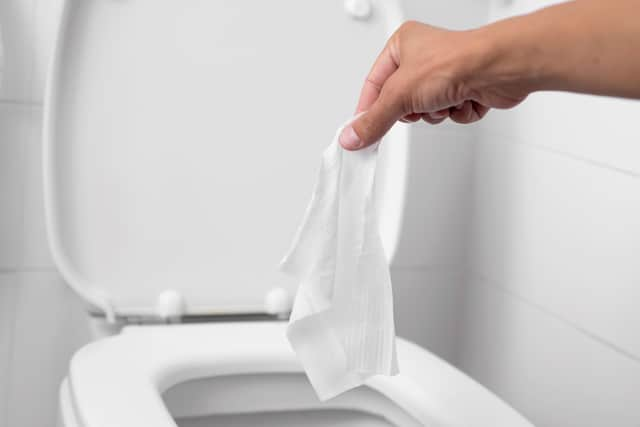Plastic wet wipes ban proposed in England under new plans to tackle water pollution
and live on Freeview channel 276
Almost all wet wipes could be banned in England under new government plans to tackle water pollution.
Environment Secretary Therese Coffey said the ban on plastic-based wipes should come into force in the next year following a consultation, as part of a wider plan to improve water quality in England.
Advertisement
Hide AdAdvertisement
Hide AdWet wipes flushed down toilets cause 93% of sewer blockages including so-called fatbergs and cost around £100 million a year to clear up, according to Water UK which represents the water industry.
Around 90% of wipes contain plastic which do not break down and over time meaning wipes become snagged and stick together, causing sewage to stop moving through pipes.
The government first said in 2018 that it planned to eliminate plastic waste including wet wipes, but decided earlier this year against banning wet wipes following another consultation. This was despite a government consultation on banning wet wipes in 2021 that led to 96% of people saying they supported the idea.
In Wales a proposed ban on plastic in wet wipes has not yet been implemented while the Scottish government consulted on a ban but has not taken further action.


Advertisement
Hide AdAdvertisement
Hide AdSome companies such as Boots and Tesco have already stopped the sale of wet wipes which contain plastic.
Ms Coffey told BBC News: "Our proposal is to ban plastic from wet wipes.”
She added that a short consultation needed to take place first as it is a “legal requirement to make sure that we can go ahead with any ban.”
The wet wipes ban is part of a broader strategy, called Plan for Water, in which the Department for Environment, Food and Rural Affairs (Defra) wants to improve England’s water quality.
Advertisement
Hide AdAdvertisement
Hide AdIt includes a potential ban on some types of so-called forever chemicals or PFAS, tackling pollution from farming and run-off from road traffic.
Pollution from intensive farming is the most common way rivers are being contaminated, according to a parliamentary report from 2022.
But opposition and environment groups have slammed the plan as weak, with environment charity River Action UK saying the government has been "asleep at the wheel" for many years.
The charity added that the government has allowed rivers to "fill up with untreated human effluent and toxic agricultural pollution".
Advertisement
Hide AdAdvertisement
Hide AdCharles Watson, CEO of River Action UK, told BBC News: "How can Defra credibly announce "stronger regulation and tougher enforcement" when there is not one single commitment today by government to put its money where its mouth is and properly re-fund statutory environmental protection agencies?".
Meanwhile Jim McMahon MP, Labour’s Shadow Environment Secretary, criticised the plans as “nothing more than a shuffling of the deck chairs and a reheating of old, failed measures that simply give the green light for sewage dumping to continue for decades to come.”
He added: "This is the third sham of a Tory water plan since the summer. There’s nothing in it that tells us how, if, or when they will end the Tory sewage scandal.”
Liberal Democrat Environment spokesperson Tim Farron also called the announcement a "complete farce".
Advertisement
Hide AdAdvertisement
Hide AdHe said: "Yet again the conservative government is taking the public for fools by re-announcing a wet wipe policy from five years ago. The government is all talk and no action.”
Water companies are in favour of a ban as they spend millions of pounds clearing up blockages caused by wet wipes.
Yorkshire Water told BBC News it welcomed the ban, as in this region wipes are the biggest cause of blockages and caused almost half of them in 2022.
Comment Guidelines
National World encourages reader discussion on our stories. User feedback, insights and back-and-forth exchanges add a rich layer of context to reporting. Please review our Community Guidelines before commenting.
